Timeline: Switzerland and the conflict in the Middle East
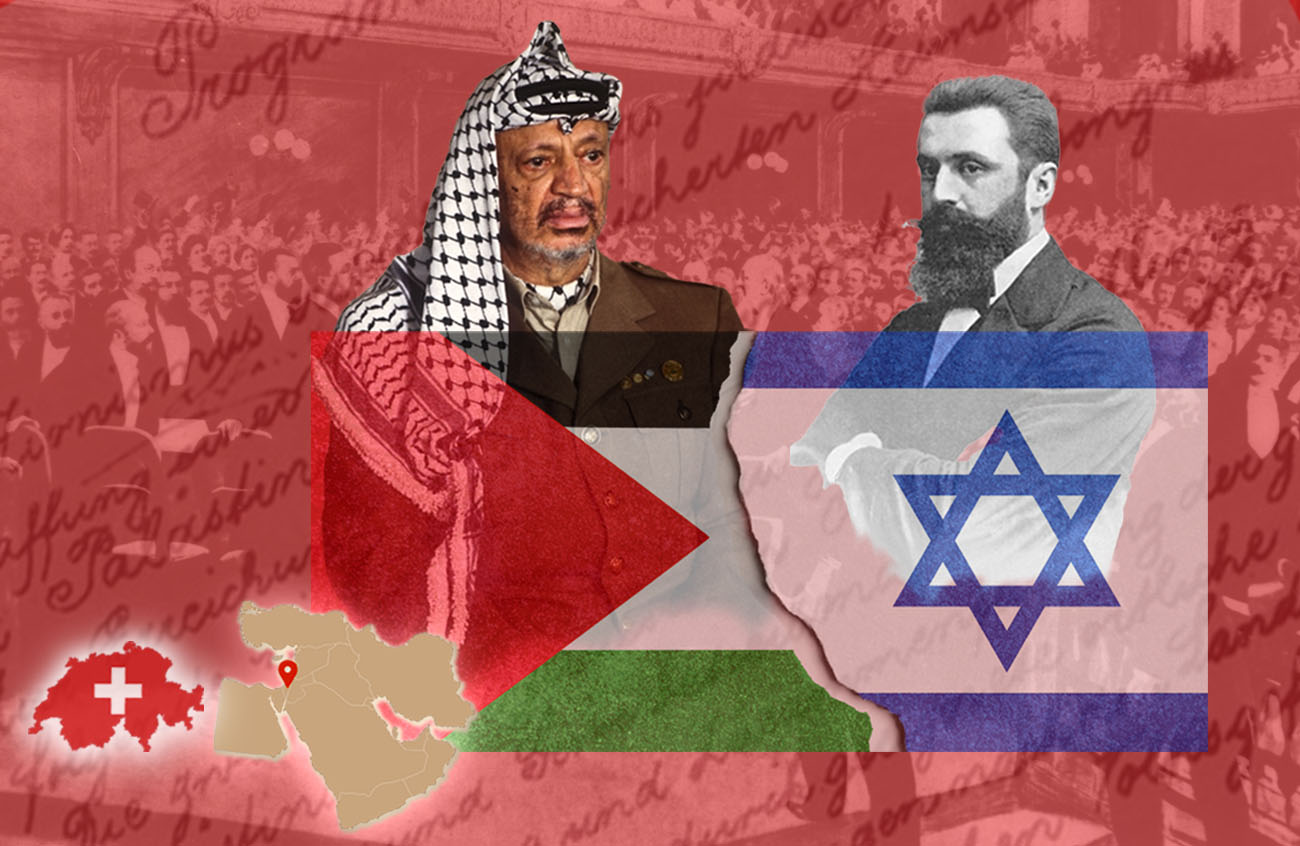
The ongoing Israeli-Palestinian war represents the latest chapter in a long-standing conflict in the Middle East. Switzerland’s role, characterised by a commitment to neutrality, humanitarian support and alignment with United Nations’ resolutions, is pivotal in addressing the dynamics of the conflict. A timeline.
Determining the starting point of the conflict in the Middle East can be a matter of perspective. While some trace its origin to ancient times, or to the late 19th-century Jewish migration, this timeline begins with the First Zionist Congress held in Basel, Switzerland, in 1897.
Opting for this starting point, particularly due to the event’s location, underscores Switzerland’s historical connection to the conflict. The Alpine country’s positions and policies through the decades have been marked by a careful balance between neutrality and humanitarian commitment, consistently aligning with the United Nations’ resolutions on the matter.
Words marked with an asterisk appear in the glossary.
August 1897: First Zionist* Congress held in Basel, Switzerland
A week after the Congress, Theodor Herzl, initiator and later the founding president of the World Zionist Organization, wrote: “At Basel I founded the Jewish State.”
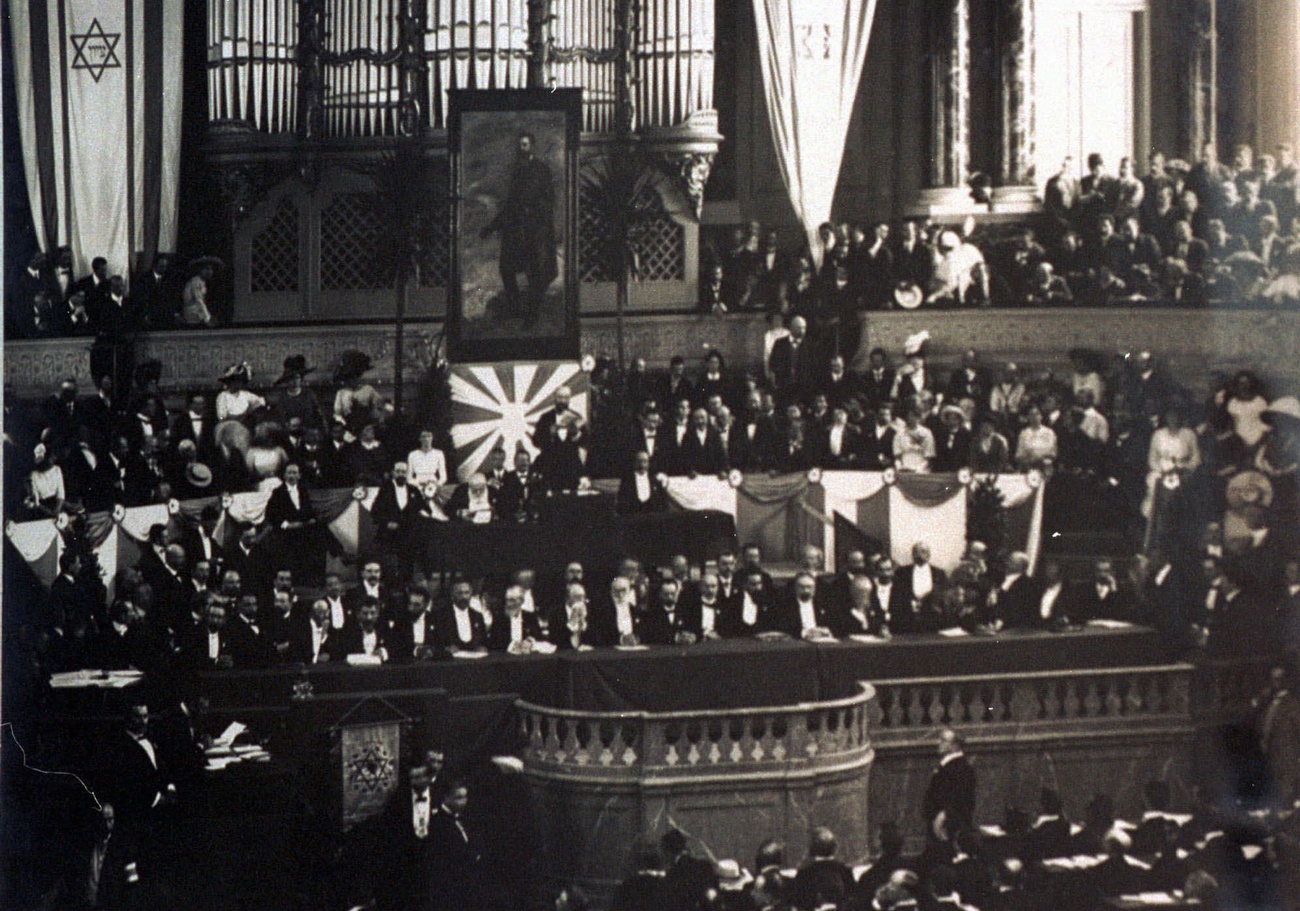
1917: The Balfour Declaration*
1918-1948: British Mandate of Palestine
1927: Switzerland establishes a consulate in Jaffa
Jaffa was a then a major port-city located in the southern part of the British Mandate of Palestine; it is now part of southern Tel Aviv. In 1927 Jaffa was still a predominantly Arab city while undergoing significant changes due to the growing Zionist movement and increasing Jewish immigration to Palestine.
1947: UN proposes a partition plan for Palestine rejected by Arab States
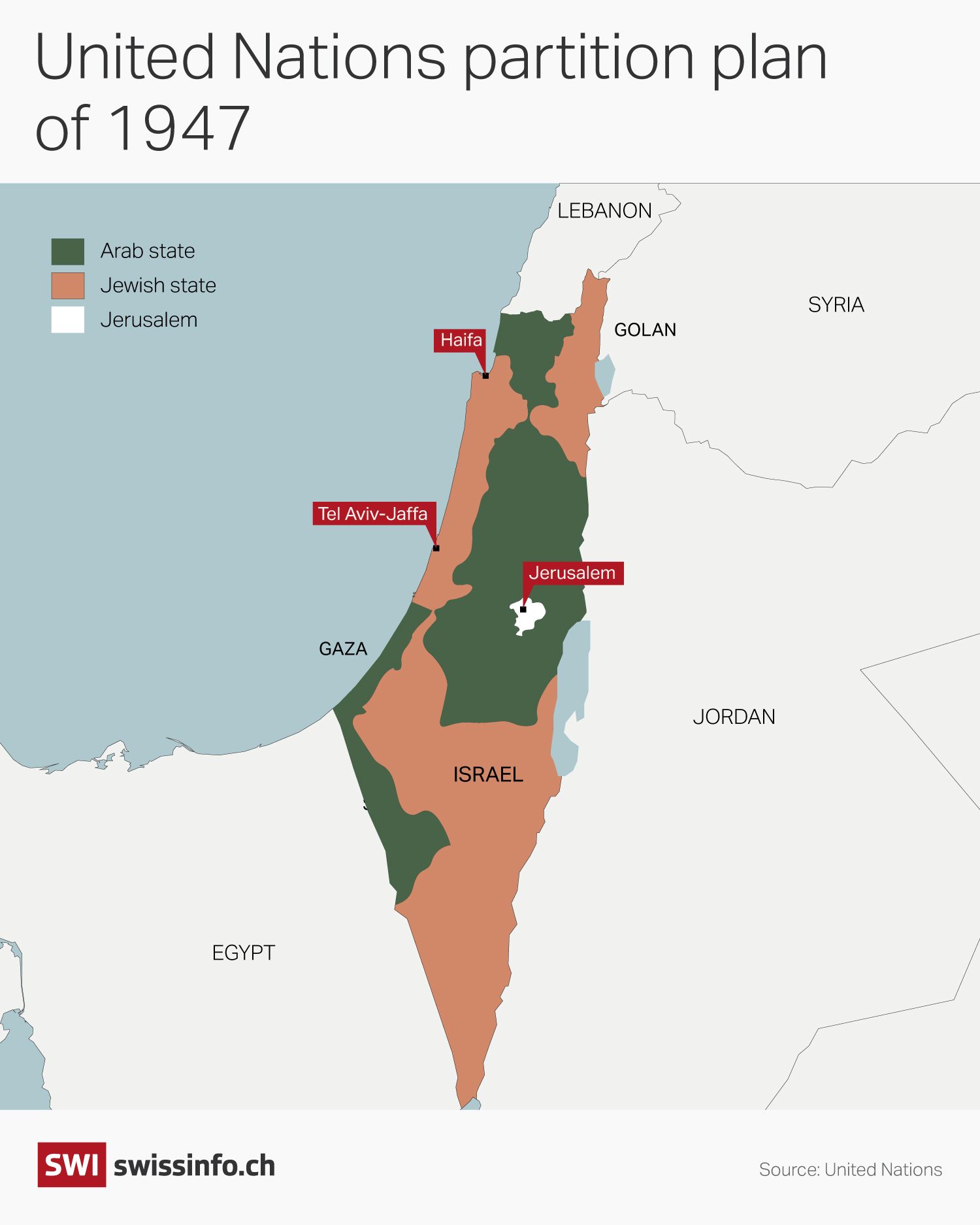
1948: Israel declares independence; Arab states attack Israel. Arab-Israeli war.
Following the expiration of the British Mandate for Palestine, the state of Israel declared its independence, leading to immediate military intervention by Arab countries including Egypt, Transjordan (now Jordan), Syria, Lebanon and Iraq. The conflict, known as the 1948 Arab-Israeli war, ended in a military defeat for the Arab states and significant territorial gains for Israel, beyond what was proposed by the UN partition plan.
A major consequence of the war was the Nakba* when an estimated 750,000 Palestinians from the 1.9 million population were made refugees beyond the borders of the State of Israel and have never been allowed to return.
1949: Switzerland recognises the State of Israel; armistice agreements
Switzerland granted de-facto recognition to Israel and Jordan on January 28, 1949. The Swiss Federal Council delayed recognition in 1948 to avoid the perception it was taking sides and to maintain trade relations with Arab countries, especially Egypt. Swiss authorities were also wary of Israel’s socialist leanings at the time and its potential alignment with the Eastern communist bloc. Official recognition followed other Western nations’ leads and the emerging armistice agreement which will be known as the Green Line. The Green Line demarcated the boundaries between Israeli forces and those of its Arab neighbours. These lines became de-facto borders of Israel until the 1967 Six-Day War.
Zionism
A political movement that had as its original aim the creation of a country for Jewish people and that now supports the state of Israel.
Balfour Declaration
A public statement issued by the British Government in 1917. It supported a “national home for the Jewish people” in Palestine, signalling a significant endorsement of Zionists’ aspirations. However, it also stipulated that “nothing shall be done which may prejudice the civil and religious rights of existing non-Jewish communities in Palestine”.
Nakba
Arabic for “catastrophe”, refers to the mass displacement and dispossession of Palestinians during the 1948 Arab-Israeli war.
Naksa
‘Setback’ in Arabic, used to describe the 1967 Six-Day War’s impact on Palestinians and Arab nations, particularly the Israeli seizure of the remaining Palestinian territories of the West Bank, East Jerusalem, Gaza Strip, as well as the Syrian Golan Heights and the Egyptian Sinai Peninsula.
Yom Kippur War
Also known as the October War, this was a conflict in 1973 between Israel and a coalition of Arab states led by Egypt and Syria to regain the seized lands, on Yom Kippur, a Jewish holy day. It resulted in a military victory for Israel.
PLO
The Palestine Liberation Organization, with its major faction Fatah, is a political and military organisation founded to liberate Palestine through armed struggle, but it later recognised Israel and sought a two-state solution.
Hamas
An Islamist militant and political organisation that seeks the establishment of a Palestinian state and is in political and military conflict with Israel. It is considered a terrorist group by many countries, including Israel, the United States and the European Union.
Intifada (1st and 2nd)
Arabic for “uprising”, both intifadas were Palestinian uprisings against Israeli occupation, characterised by widespread protests, civil disobedience and violence.
Oslo Accords:
A series of agreements in the 1990s between Israel and the PLO, aiming to achieve a treaty based on UN resolutions 242 and 338 and to establish a framework for the future relations between the two parties.
Abraham Accords:
A series of agreements signed in 2020 to normalise relations between Israel and several Arab states. Initiated by the UAE and followed by Bahrain, Morocco and Sudan, the agreements marked a shift from the longstanding Arab refusal to recognise the State of Israel to a new phase of open diplomatic relations.
1951: Switzerland opens a diplomatic legation in Tel Aviv
1967: Six-Day War
Israel initiated what it described as a preventive defensive war against Jordan, Egypt and Syria, citing their apparent preparations for an invasion. This offensive caught the Arab governments off guard and led to Israel significantly expending its territory to include the Sinai Peninsula, the Gaza Strip, the West Bank, East Jerusalem and the Golan Heights.
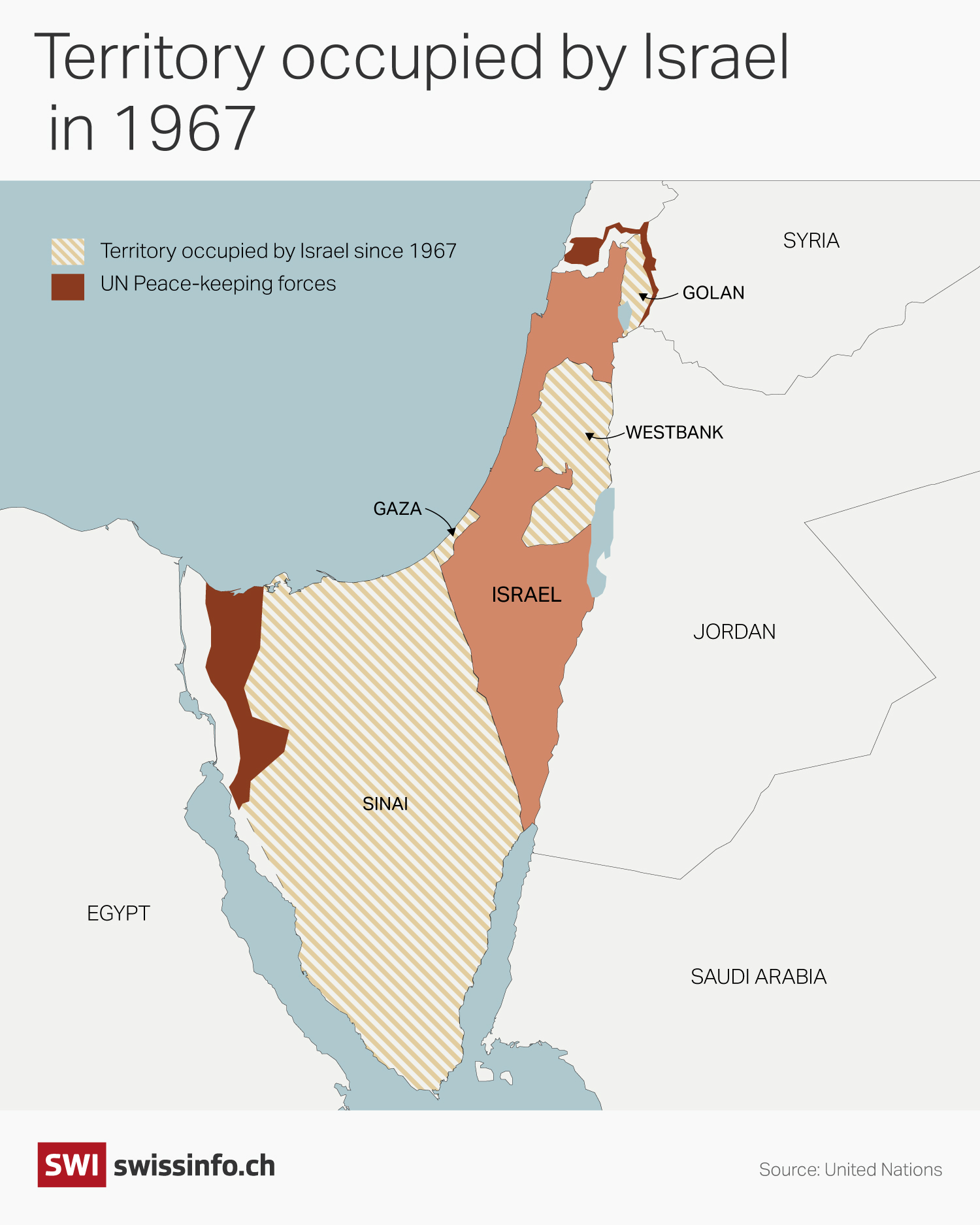
1973: Yom Kippur War*
Egypt and Syria launched a surprise attack on Israel, leading to a brief but intense conflict. During this period, Switzerland’s diplomacy clarified its Middle East position, expressing sympathy towards Israel, particularly after the Yom Kippur War. This was also reflected in Switzerland’s decision to stop UNESCO subsidies following a resolution by the UN agency critical of Israel in 1975.
At the same time, Switzerland also began adopting a more proactive and nuanced stance towards the Middle East conflict, partly influenced by Palestinian militants’ attacks on Swiss soil, including the unsolved 1970 bombing of a Swissair plane, suspected to be linked to Palestinian militants. The bombing killed all 47 people on the plane.
October 22, 1973: UN Resolution 338
The resolution calls for all parties to cease all firing and terminate all military activities immediately. It states all parties should start negotiations with an aim to establish a just and durable peace in the Middle East.
Switzerland supported the peace process, but its specific stance on this resolution is not clearly documented.
1975: Switzerland opens the Palestine Liberation Organization (PLO) office in Geneva
The opening of the office was part of a broader Swiss strategy to engage with different parties in the Middle East conflict. This approach was influenced by Switzerland’s desire to play a mediating role and its concern for the safety of Swiss citizens abroad, particularly following the series of Palestinian militants’ attacks on its soil.
There were allegations at the time of a secret deal between Switzerland and the PLO offering diplomatic support for the Palestinian cause in return for assurances to be spared from attacks. A Swiss government investigation found no evidence to confirm such a meeting or agreement.
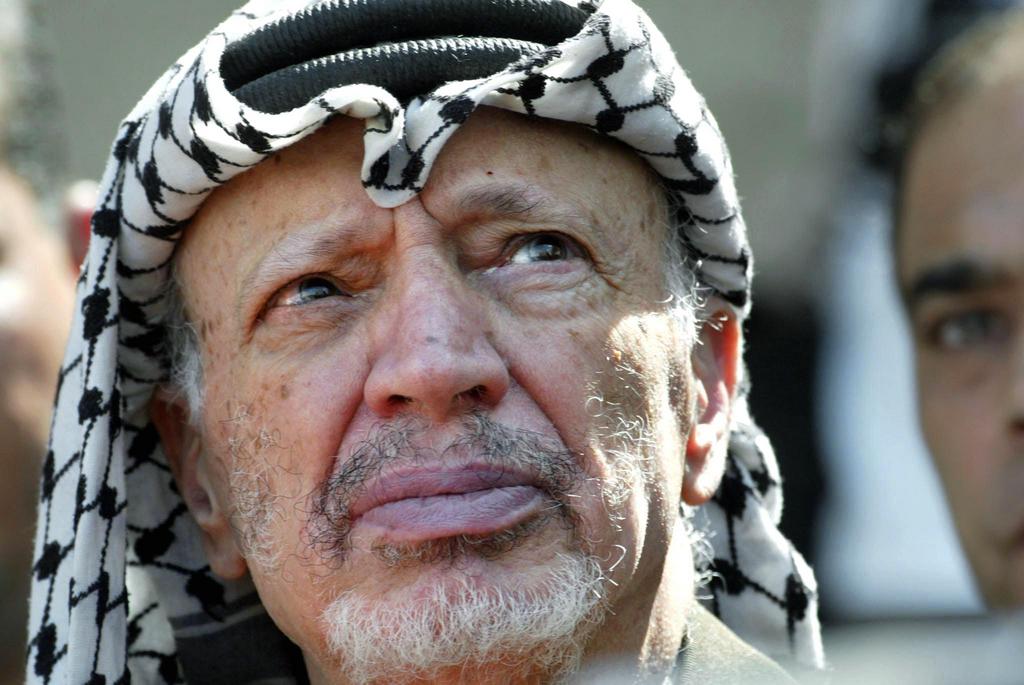
1979: UN Resolutions 446 and 452
Both resolutions address Israeli settlements in Palestinian territories occupied since 1967, including East Jerusalem. Resolution 446 declared these settlements as having “no legal validity”, while Resolution 452 calls on Israel to cease the construction of such settlements.
Switzerland’s stance on both resolutions is clear: the nation consistently advocated for the end of the Israeli settlement activities in the occupied territories, aligning with the UN’s position and emphasising the need for a halt in the settlement expansion.
1980: UN Resolutions 465, 476 and 478
Resolution 465 calls for Israel to dismantle existing settlements and halt the planning and construction of new ones. Resolution 476 reiterates the illegality of Israel’s actions to alter Jerusalem’s status and demographic composition. Resolution 478 condemns Israel for declaring Jerusalem as its capital and urged member states to withdraw their diplomatic missions from the city.
Switzerland’s stance was in line with these resolutions: opposing Israeli settlements in occupied territories, recognising East Jerusalem as occupied territory, and supporting a negotiated solution for Jerusalem while maintaining its embassy in Tel Aviv.
1981: UN Resolution 497
The resolution determines that Israel’s imposition of its laws in the Golan Heights is null and void and without international legal effect.
Switzerland considers the Golan Heights as occupied territory and opposes its annexation.
1987-1993: First Intifada*
1988: Creation Of Hamas*
Historically, Switzerland refrained from labelling Hamas a terrorist organisation, maintaining contacts with them as part of its policy of inclusive dialogue and good offices. A Hamas delegation even visited Switzerland in 2012 to attend a session of the Geneva-based Inter-Parliamentary Union (IPU) and a university conference on Gaza. This policy remained in place until 2023.
1993: Oslo Accords*; Switzerland supports the peace process

2000-2005: Second Intifada
2002: UN Resolutions 1397 and 1402
Resolution 1397 affirms the vision of two states, Israel and Palestine, living side by side within secure and recognised borders. Resolution 1402 calls for the withdrawal of Israeli forces from Palestinian cities and the cessation of violence, urging a return to negotiations.
Switzerland’s position aligned with these resolutions, supporting both the two-state solution as a foundation for peace and advocating for an end to violence and the resumption of diplomatic talks.
October 2003: Geneva Initiative
The peace proposal addressing key conflict issues (Jerusalem, Palestinian refugees and border delineation) was signed by Israeli and Palestinian figures and facilitated by Swiss academic Alexis Keller and his father, a former diplomat and banker.
Despite international support, the initiative faced opposition and criticism for Switzerland’s involvement. By 2023 Switzerland distanced itself from the plan, citing a dramatically changed political context and the need for more innovative approaches.
2003: UN Resolution 1515
The resolution endorses the “Roadmap for Peace”, calling for an end to violence and calling for a two-state solution. Switzerland fully supports the resolution.
2006: Hamas wins Palestinian legislative elections; Switzerland maintains contact with Fatah (PLO) and Hamas
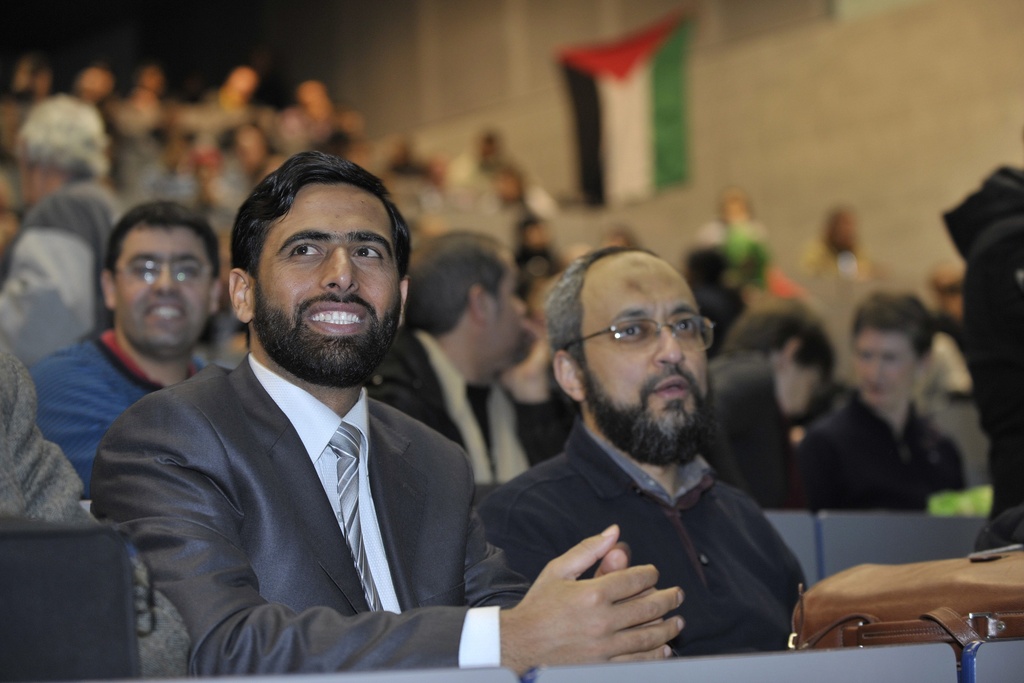
2008-2009, 2012, 2014, 2021: Israeli-Palestinian wars; Switzerland offers humanitarian aid and calls for ceasefires
September 2020: Abraham Accords*
A United States-brokered series of agreements to normalise relations between Israel and several Arab states.
November 2020: Ignazio Cassis’s Middle East visit
Swiss Foreign Minister Ignazio Cassis visits Israel, Palestine and the United Arab Emirates, focusing on implementing Switzerland’s Middle East and North Africa (MENA) Strategy for 2021-2024. Key discussions with regional leaders include dialogue facilitation, innovation and sustainability.
January 2022: Switzerland decides to drop the Geneva Initiative and redefine its Middle East strategy
2023: Israeli-Palestinian war
In response to the attacks on Israel by Hamas militants on October 7, Switzerland condemned the attacks, with the Federal Council declaring that Hamas should be considered a terrorist organisation. In response to the attacks, Israel imposed a total blockade on the Gaza Strip and declared war on Hamas.
Edited by Virginie Mangin/Livm

In compliance with the JTI standards
More: SWI swissinfo.ch certified by the Journalism Trust Initiative









You can find an overview of ongoing debates with our journalists here . Please join us!
If you want to start a conversation about a topic raised in this article or want to report factual errors, email us at english@swissinfo.ch.